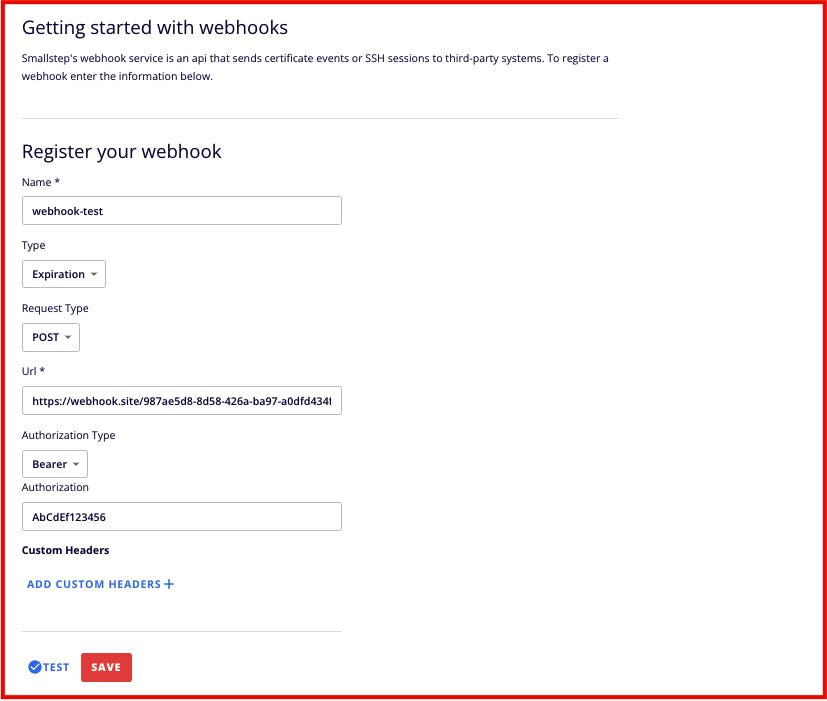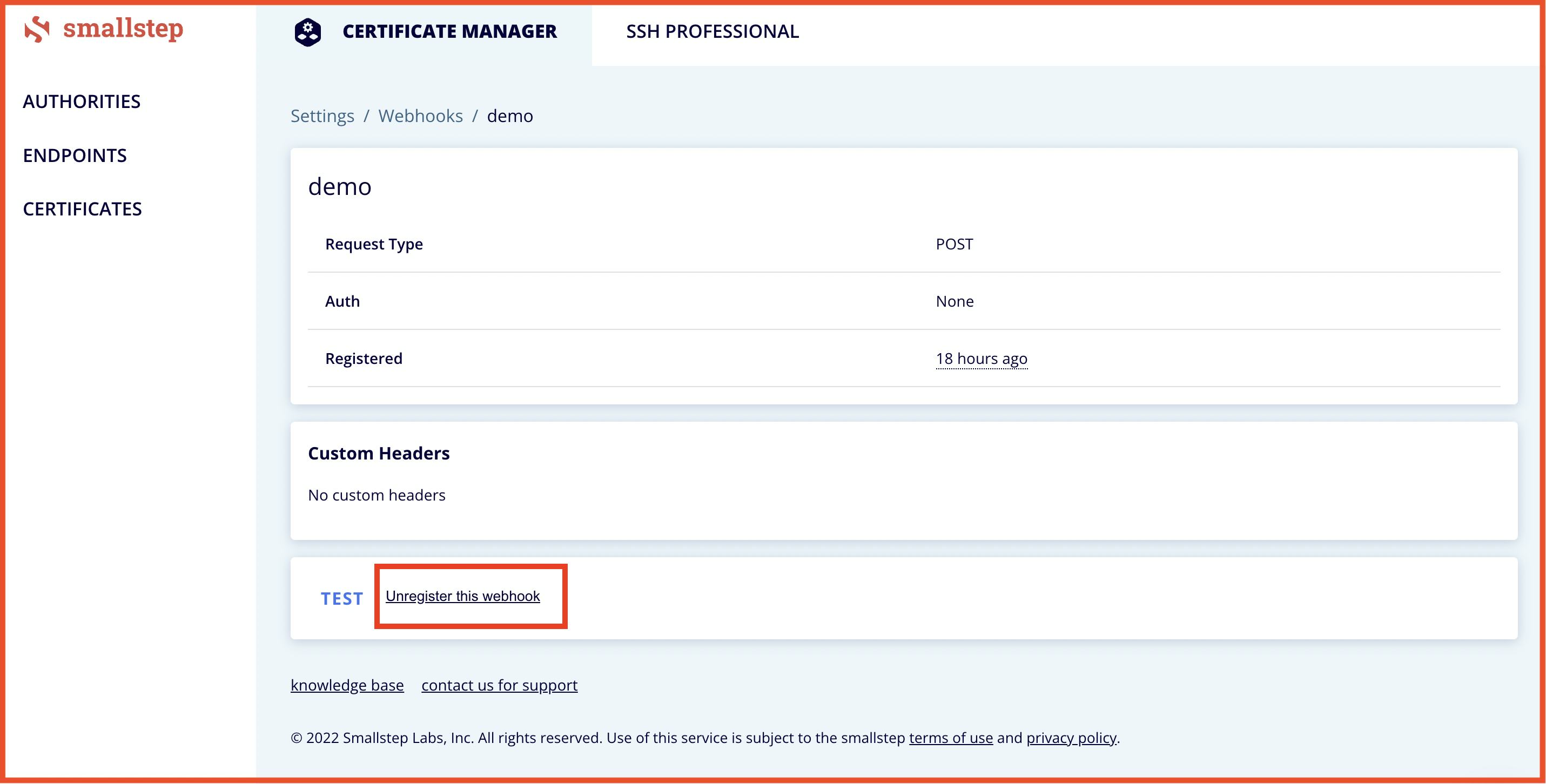Webhook Events
Webhook Events allow for real-time logging of SSH sessions,
certificate creation, and certificate expirations events. You can use Webhook Events to:
- Alert on certificate expiry - Prevent certificate expiry related outages with proactive notifications on upcoming expirations.
- Stream events to monitoring solutions - Push detailed certificate information to third-party monitoring and alerting systems.
- Monitor certificate operations - Ensure your automated certificate toolchain is operating as expected.
Webhook event types
We currently have four webhook event types, namely:
-
SSH: Sends a webhook event for SSH start and stop sessions and user change events.
-
Expiration: Sends a webhook event for Certificate Manager when a certificate is within the last 25% of its lifetime, and again when it expires.
-
Certificate: Sends a webhook event for Certificate Manager with basic certificate details whenever a certificate is created or expires.
-
All: Sends events for everything above, for both SSH and Certificate Manager.
Note: We do not send certificate expiration events for OIDC certificates, to minimize noise, since they're usually short-lived. However, certificate creation events for such certificates will always be sent.
Using webhook events
To register a webhook, go to Settings > Webhooks and fill out the form as shown below:

Webhook events response formats
Here are examples of the response data you should expect to receive for each webhook event type:
SSH 'session start' event
{
"category": "ssh-session",
"hostname": "example-host.example.com",
"username": "tester",
"id": "d0547bbd-aab6-4531-b809-868f60d0bda7",
"timestamp": "2022-08-01 20:29:23.333679027 +0000 UTC",
"type": "start"
}
SSH 'session end' event
{
"category": "ssh-session",
"hostname": "example-host.example.com",
"username": "tester",
"id": "d0547bbd-aab6-4531-b809-868f60d0bda7",
"timestamp": "2022-08-01 20:32:14.816883566 +0000 UTC",
"type": "end"
}
SSH 'user change' event
{
"category": "ssh-session",
"hostname": "example-host.example.com",
"username": "root",
"id": "d0547bbd-aab6-4531-b809-868f60d0bda7",
"timestamp": "2022-08-01 20:31:47.771260977 +0000 UTC",
"type": "user_change"
}
Where:
| Parameter | Description |
| category | The webhook event type. One of ssh-session, certificate-request, or certificate-expiration. |
| hostname | The name of the registered host |
| username | The posix username of the user responsible for the ssh session |
| id | The Smallstep ssh session id |
| timestamp | The time at which the event occurred |
| type | The specific type of SSH event type |
Certificate creation event
{
"category": "certificate-request",
"authorityId": "5c780190-4e4e-4c5a-9331-50be29b28e21",
"serialNumber": "217736770851791642908500119529647273613",
"id": "4f2f0c29-704a-46f8-8f90-f7f74675b169",
"notBefore": "2022-08-01T20:36:51.000Z",
"notAfter": "2022-08-01T20:42:51.000Z",
"certificate": "-----BEGIN CERTIFICATE-----\nMIICITCCAcegAwIBAgIQOyXzxXEspOAfi/10+hPMLjAKBggqhkjOPQQDAjAhMR8w\nHQYDVQQDExZKV0sgU0EgSW50ZXJtZWRpYXRlIENBMB4XDTIyMDgwMTIwMzY1MVoX\nDTIyMDgwMTIwNDI1MVowFDESMBAGA1UEAxMJbXlzZXJ2aWNlMFkwEwYHKoZIzj0C\nAQYIKoZIzj0DAQcDQgAEfDkIN/DlpolcxVqMu5iZ0zJqVlAXfasCJvGxwBJKpQdS\nZJOLsenrguwJJpLqNuj3icIhI6gFodqvLpNAcaJ/zKOB7TCB6jAOBgNVHQ8BAf8E\nBAMCB4AwHQYDVR0lBBYwFAYIKwYBBQUHAwEGCCsGAQUFBwMCMB0GA1UdDgQWBBRM\nO8Ak/HRgQ9j8iIK4xgONh+/W8DAfBgNVHSMEGDAWgBSNeT/nLC3Z+iRpVXVdvgpH\nlJRzwjArBgNVHREEJDAigiBteXNlcnZpY2UuaW50ZXJuYWwubXljb21wYW55Lm5l\ndDBMBgwrBgEEAYKkZMYoQAEEPDA6AgECBA9hdXRob3JpdHktYWRtaW4EJGQzMTc0\nMjM2LTE1YzEtNDEzOC04OTJkLTVlZDIzNDcxN2M5YTAKBggqhkjOPQQDAgNIADBF\nAiEA5kXI0dB6xMnEMAiwEigy0vYMHXYvX97BderaMFGdmSECIH2FQ/5A7RyxdkbE\nNVOdaxxFAW8YBCiyiKxnu0BzOM+C\n-----END CERTIFICATE-----\n",
"subject": {
"commonName": "myservice",
"country": "",
"organization": "",
"organizationalUnit": "",
"locality": "",
"province": "",
"street": "",
"state": "",
"email": ""
},
"sans": [
{
"type": "DNS",
"value": "myservice.internal.mycompany.net"
}
]
}
Certificate expiring/expired event
{
"category": "certificate-expiration",
"authorityId": "5c780190-4e4e-4c5a-9331-50be29b28e21",
"serialNumber": "204736770851791642908500119529647273613",
"id": "4a0d055f-8ac2-463f-b090-0e940fadc0c3",
"notBefore": "2022-08-01T20:48:20.000Z",
"notAfter": "2022-08-01T20:54:20.000Z",
"certificate": "-----BEGIN CERTIFICATE-----\nMIICHzCCAcSgAwIBAgIRAJoG3iYtwd9xSbAsRjDMdo0wCgYIKoZIzj0EAwIwITEf\nMB0GA1UEAxMWSldLIFNBIEludGVybWVkaWF0ZSBDQTAeFw0yMjA4MDEyMDQ4MjBa\nFw0yMjA4MDEyMDU0MjBaMBQxEjAQBgNVBAMTCW15c2VydmljZTBZMBMGByqGSM49\nAgEGCCqGSM49AwEHA0IABNfWJtHDDXlvfiljmzzgNdzmmk5Xhxf84RiP9DShOXxI\nNgndPXYp7d49UCVKm3IrJ3HY/6WBh2g/cv0p2BQ3kUejgekwgeYwDgYDVR0PAQH/\nBAQDAgeAMB0GA1UdJQQWMBQGCCsGAQUFBwMBBggrBgEFBQcDAjAdBgNVHQ4EFgQU\nNgNvb8W9k/5/PHNQYx+xaQ45faQwHwYDVR0jBBgwFoAUjXk/5ywt2fokaVV1Xb4K\nR5SUc8IwKwYDVR0RBCQwIoIgbXlzZXJ2aWNlLmludGVybmFsLm15Y29tcGFueS5u\nZXQwSAYMKwYBBAGCpGTGKEABBDgwNgIBAQQEbmFtZQQrQ09pRDNLMzE1Mms3TW5Q\nNDR2eWlaLXNZaVphMmtSZU9fWFRNRG54RTB3VTAKBggqhkjOPQQDAgNJADBGAiEA\nuWabixlFwJif3+ypPdJax5xPwCPT+LxL2ETNP0RwGvICIQC/fdBn7b+W+sa9GSLx\nDFNysUCX39uO7F7XbAEJBRFa8A==\n-----END CERTIFICATE-----\n",
"subject": {
"commonName": "myservice",
"country": "",
"organization": "",
"organizationalUnit": "",
"locality": "",
"province": "",
"street": "",
"state": "",
"email": ""
},
"sans": [
{
"type": "DNS",
"value": "myservice.internal.mycompany.net"
}
]
}
Where:
| Parameter | Description |
| category | The specific webhook event type. |
| authorityId | The ID of the certificate authority responsible for the issuance of the created, about to expire, or already expired certificate. |
| serialNumber | The serial number of the certificate |
| id | The Smallstep UUID of the certificate |
| notBefore | The time before which the certificate is ineligible for use. |
| notAfter | The time after which the certificate will no longer be valid (i.e, expiration time) |
| certificate | The PEM encoded format of the certificate |
| subject | An object containing details of the entity that the certificate was issued for. |
| sans | An array of the details of the certificate's subject alternative names |
Deleting webhook events
If you no longer have need for a webhook and wish to delete it:
- Go to Settings > Webhooks
- Click on the webhook's name
- Click on Unregister this webhook as shown below:

Last updated on February 3, 2026
Introducing
Device Identity
Ensure that only company-owned devices can access your enterprise's most sensitive resources.